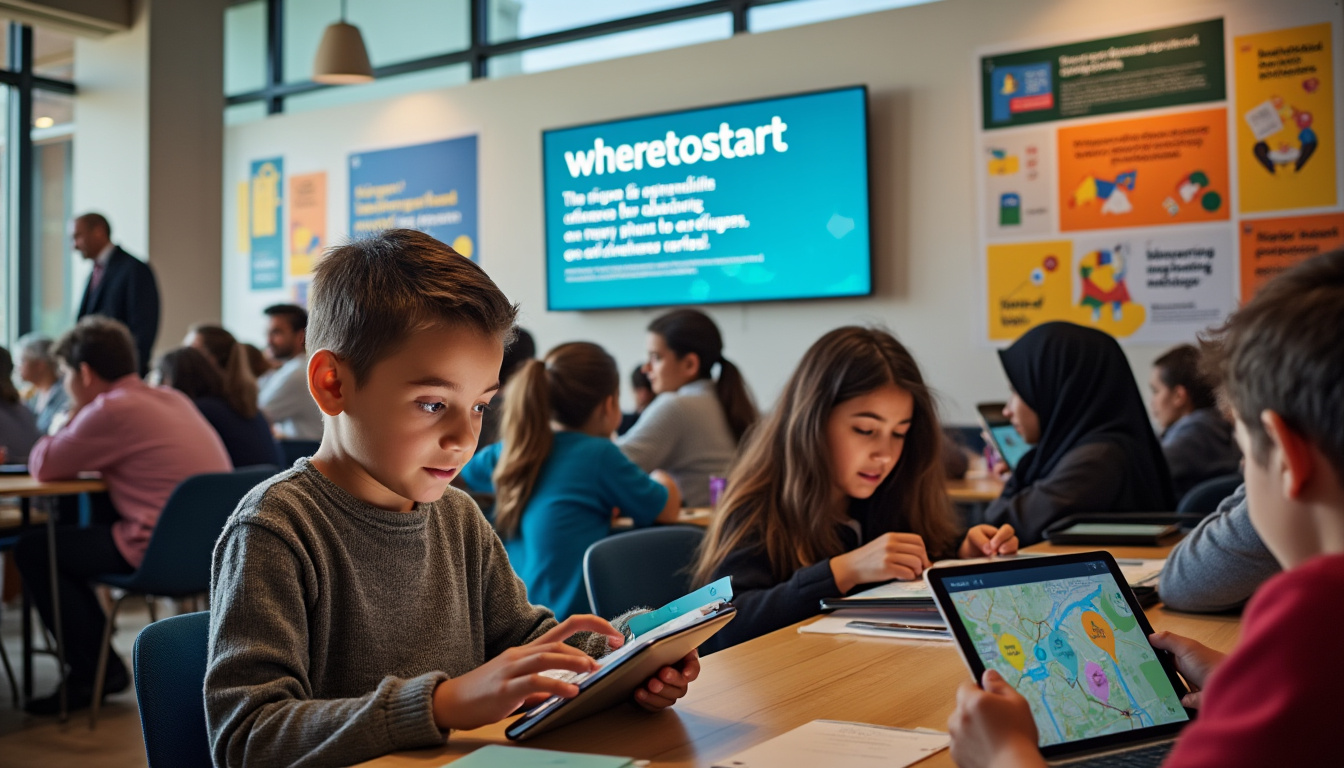When an armed conflict erupts, such as the one that has affected Ukraine since 2022, the consequences have a devastating impact on human lives and a country’s economy. The war has led to a massive displacement of the population, particularly of Ukrainians, to neighboring countries, including Poland. More than 1.5 million Ukrainians have sought refuge in Poland, significantly increasing the population and posing new economic challenges. This reality has required a rapid and effective response from both government and private companies. It is in this context that Mastercard launched the ‘WhereToStart’ initiative, a digital tool designed to help these refugees rebuild their professional and economic lives.
The Background to Mastercard’s WhereToStart Initiative
Understanding the origins of the ‘WhereToStart’ initiative is essential to assess its impact. From the very beginning of the Russian invasion of Ukraine, it was clear that more than a million people would be displaced. In Poland, the immediate result was a massive influx of refugees, but also a 4% increase in the local population.
With this demographic shift came opportunities. Indeed, in 2022, it was reported that more than 310,000 new businesses were created in Poland, 10% of which were started by Ukrainians. However, this dynamic also created tensions: local businesses feared economic losses and increased competition.
The Needs of Refugees and Local Businesses
Faced with these challenges, it was imperative to find innovative solutions. Refugees, seeking safety and work, needed concrete assistance. This involved not only financial resources, but also advice on business locations, local market needs, and survival strategies in a competitive environment. This is where initiatives like ‘WhereToStart’ come in.
This digital platform provides a framework that successfully combines the concerns of new Ukrainian entrepreneurs with the needs of Polish businesses. Indeed, using data analysis tools, ‘WhereToStart’ helps determine the areas where new businesses would have the best chance of success.
| Analysis Factors | Relevant Data |
|---|---|
| Pedestrian Traffic | High-traffic areas are more attractive for businesses. |
| Transaction Patterns | Analysis of local customer spending habits. |
| Real Estate Trends | Identification of in-demand retail spaces. The aggregated data used by ‘WhereToStart’ not only helps identify the best marketing areas, but also provides an analysis of unmet consumer needs. By placing ‘open to Ukrainians’ signs at store entrances, Polish business owners expressed their willingness to collaborate and welcome their new neighbors. |
The Positive Impact of Digital Tools on Social Inclusion
Mastercard’s ‘WhereToStart’ initiative isn’t just about economics. It also represents a powerful symbol of inclusion. From a social perspective, it has brought together diverse communities around a common goal: reconstruction. Polish businesses and Ukrainian refugees have begun working together to identify market opportunities.
Improving the Perception of Refugees
The program has led to a notable shift in the image of refugees, moving from an economic burden to that of active contributors to society. Over 40% of new businesses in some regions of Poland reported using this tool, a testament to its effectiveness. This result has not only benefited the local economy but also contributed to improving the social climate and building bridges between communities.
This transformation in the image of refugees has been particularly important at a time when media narratives could easily lean toward division or conflict. ‘WhereToStart’ has created a platform where solidarity has replaced mistrust. As a result, this initiative was recognized at the 2024 Cannes Lions Festival, where it received the Creative Data Grand Prix, celebrating its innovative approach blending business and kindness. Facilitating connections between Polish businesses and refugees
Exchanging skills in the market
- Cross-funding to support local initiatives
- Promoting skills and innovation
- Ukrainian refugees bring a wealth of skills and innovations. By using ‘WhereToStart’, they can not only establish their businesses, but also integrate their know-how into the Polish economy. This opens the door to synergies that can benefit all stakeholders.
To maximize these opportunities, Mastercard has encouraged initiatives that promote training and access to resources. This support, in synergy with local offerings, helps create an environment conducive to economic inclusion.
Initiatives
Objectives
| Free training for refugees | Developing entrepreneurial skills |
|---|---|
| Partnerships with local businesses | Facilitating the Integration of Refugees into the Economic Fabric |
| Creating Mutual Aid Networks | Promoting Solidarity and the Exchange of Experiences |
| Implementation Challenges and Future Prospects | Although the ‘WhereToStart’ initiative has been an undeniable success, it is not without its challenges. Implementing such a project requires complex logistics, government support, and community collaboration. Recognizing and overcoming these challenges is fundamental to the initiative’s sustainability. |
Logistical Challenges
Data collection and analysis are crucial. For ‘WhereToStart’ to operate effectively, access to accurate and up-to-date data on consumer trends, local infrastructure, and residents’ needs is essential. Furthermore, user training is also essential to ensure that businesses can fully leverage the tools offered.
Data Access: How to Ensure Quality and Relevance
Training: What resources should be mobilized to ensure the tool’s effective use?
- Collaboration: What role for local governments and NGOs?
- Development prospects
- In the long term, the initiative could expand beyond Poland, reaching other refugee-hosting countries. The modularity of ‘WhereToStart’ makes it an adaptable tool. As other humanitarian crises emerge, such a tool could be deployed to support not only refugees, but also local communities where economic stress is high.
Expanding the initiative
Aims
| Extension to other countries | Supporting refugees in diverse contexts |
|---|---|
| International partnerships | Exchanging best practices |
| Impact evaluation | Measuring success and adjusting strategies |
| Lessons learned and recommendations for the international community | Projects such as ‘WhereToStart’ offer valuable lessons for the international community. The way humanitarian initiatives can interact with the private sector opens the way to new forms of engagement with vulnerable populations. It is a model that could be replicated elsewhere, where refugee integration and rehabilitation are essential. |
Cultivating Empathy Through Collective Action
The success of ‘WhereToStart’ relies on collaboration and sensitivity to the needs of refugees. Businesses, governments, and NGOs must learn to work together proactively to establish accessible and sustainable systems of inclusion. Recognizing the unique skills that refugees can bring to society is essential to building a more inclusive community.
Creating Synergies Between Economic Actors
Encouraging Local Initiatives
- Designing Long-Term Support Programs
- Toward a Comprehensive Response
- As global migration challenges continue to grow, it is crucial to adopt a comprehensive approach to managing population movements. The ‘WhereToStart’ model can serve as an example for inclusive solutions, as it illustrates the importance of a coordinated response to a humanitarian crisis. The economic resilience of refugees is also the resilience of the societies that host them.
Principles to remember
Concrete actions to adopt
| Cross-sector collaboration | Strong public-private partnerships |
|---|---|
| Accessibility | Guarantee resources for all refugees |
| Adaptability | Customize tools for different contexts |




